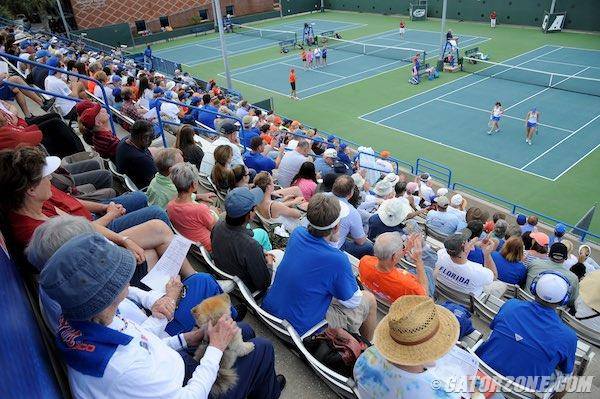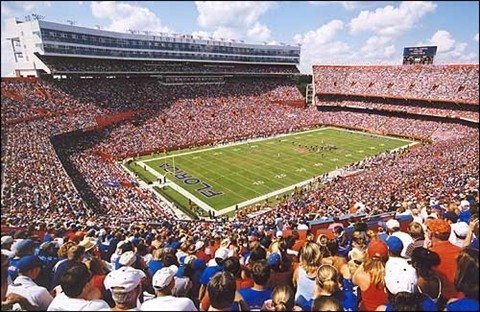American College Sports are difficult to fully comprehend unless you have grown up around them or have attended a College sporting event. Sports facilities and crowd attendances can be similar to professional sporting events, where football games can garner over 100,000 spectators. College tennis matches can have around 600 spectators a match depending on which college it is, which is often times a larger number than many professional tournaments tennis players compete in. College tennis allows an individual to further their education and graduate with a degree, while at the same time, competing and traveling throughout the US playing the sport they love.
The college experience is really what the individual makes of it, with many taking advantage of the many resources it offers and using it as a stepping stone into becoming a tennis professional competing on the tour. The amount of resources that American Universities offer are almost endless. Ranging from top -notch tennis facilities (many in the 10+ million dollar range), coaches, fitness trainers, athletics trainers, nutritionists, sports psychologists, academic tutors, academic advisors and more. All of those resources are put in place in order for the student-athlete to maximize their chances at being successful both in the classroom as well as the courts. Some of the top athletes worldwide that competed in college sports were: Michael Jordan, Mia Hamm, Tiger Woods, John Isner, John McEnroe, Brett Favre, Tim Duncan, James Blake, Mike and Bob Bryan and many more. All of these athletes took advantage of what college athletics offered and they went on to become some of the best athletes in the world in their respective sports.
With the increased physicality of the modern tennis game, making an impact at a young age, is increasingly challenging for less-than-fully developed bodies. The rising average age of the top 100 is testament to the mental and physical maturity required. As a result of this, many top tennis players are making the decision to pursue college tennis. Once at college, the majority end up playing more matches than they ever could have imagined, in front of some of the most hostile crowds a tennis player could experience. Add on-court coaching and daily hard work on/off court to the equation and it results in the tennis players maturing mentally and physically at a high rate. This in turn, makes them smarter, stronger and overall better athletes, well prepared for the challenges the pro tour will bring after their college tennis careers end. College tennis is not just for those players that don't want to pursue a pro tennis career afterwards, it is also for those that do. Without having to worry about the often times unrealistic and expensive professional tour life at 18, college athletes use those years to compete, grow and mature. By the time their college careers end, they are better prepared for the challenges the pro tour will bring.
James Blake is an example of someone who played college tennis for 2 years, attending Harvard University. After Blake's two years at the University, he had already risen to the top of the college tennis ranks. Therefore, he felt ready and decided to turn pro. Bradley Klahn is an example of an athlete that went to college for 4 years. Klahn spoke to USA Sports Today and said his years at Stanford helped him "grow up" and that he never intended to jump to the pros after high school because he knew he wasn't ready for the rigors of the tour. "I've never had anyone tell me they regretted going to school, but I've heard some say that maybe they regret not going," the 73rd-ranked Klahn said. John Isner has always been very vocal about his college tennis career and the effect it has had on his career. He had this to say - “Without college I wouldn’t be here today. I can say that with 100% certainty. I wasn’t nearly good enough to go pro after high school. I didn’t even have pro aspirations. I got so much better at University of Georgia. Once I did get so much better, I realized that I could maybe play professional tennis. Like I said, without Georgia I wouldn’t be here right now, so for me it was the right decision. I had to go there. But, you know, everybody’s different.” Isner added that with the game being as physical as it is, college may be a better option for young players. “I feel like a lot of top Americans now are going the college route,” Isner said.“The average age of the top 100 is 26. It’s not how it used to be in the ’80s and ’90s where you would have 19‑year‑olds, 20‑year‑olds inside the top 10 in the world. It doesn’t happen like that now. In my opinion, it takes longer for guys to develop. The game has gotten more physical and more mature, for sure.” Then there is the 37th ranked Steve Johnson who spent four years at USC ..and had this to say - "It's tough for, I think, 17-, 18-, 19-year old kids to come out here and dominate like they did maybe a decade ago, guys are bigger, stronger, tougher. It's not as easy. ... I think in college, at least for me, I got a chance to mature and realize what I wanted to do and what tennis meant to me."
As evidenced, there are many options for college athletes, with each case being an individual and unique one. But the common belief college athletes share is....there is nothing to lose by competing in college sports, instead there is everything to gain. On top of everything else, student athletes learn to work and thrive in a team environment, which alters and shapes them into becoming well rounded, unselfish, team-oriented and driven individuals. The type of candidates that successful companies look to hire.
Lisa Raymond (ex- University of Florida player, 3x NCAA champion as a Gator, 11 WTA Grand Slam titles, Olympic Gold Medalist, Achieved world #1 doubles ranking, and #15 in singles)
" I wouldn't trade my 2 years at the University of Florida for anything in this world. Not only did going to college help in my development as a professional tennis player but as a person as well. Being on a team, working together for a common goal, and sharing experiences with my teammates are moments I will cherish forever. I am forever a part of Gator Nation, an extended family that I am extremely proud of.” Go Gators!




